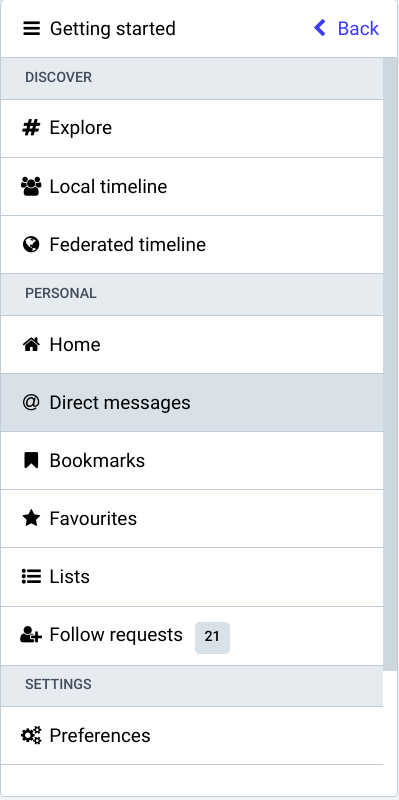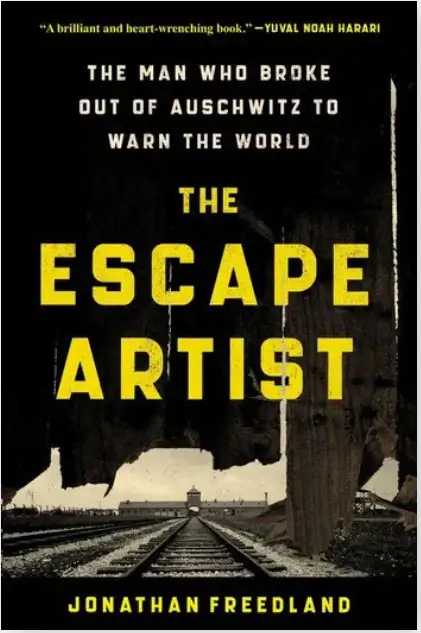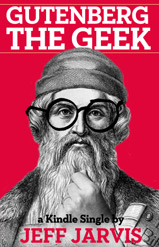
There has been much praise in human chat — Twitter — about Ted Chiang’s New Yorker piece on machine chat — ChatGPT. Because New Yorker; because Ted Chiang. He makes a clever comparison between lossy compression — how JPEGs or MP3s save a good-enough artifact of a thing, with some pieces missing and fudged to save space — and large-language models, which learn from and spit back but do not record the entire web. “Think of ChatGTP as a blurry JPEG of all the text on the Web,” he instructs.
What strikes me about the piece is how unselfaware media are when covering technology.
For what is journalism itself but lossy compression of the world? To save space, the journalist cannot and does not save or report everything known about an issue or event, compressing what is learned into so many available inches of type. For that matter, what is a library or a museum or a curriculum but lossy compression — that which fits? What is culture but lossy compression of creativity? As Umberto Eco said, “Now more than ever, we realize that culture is made up of what remains after everything else has been forgotten.”
Chiang analogizes ChatGPT et al to a computational Xerox machine that made an error because it extrapolated one set of bits for others. Matthew Kirschenbaum quibbles:
Agreed. This reminds me of the sometimes rancorous debate between Elizabeth Eisenstein, credited as the founder of the discipline of book history, and her chief critic, Adrian Johns. Eisenstein valued fixity as a key attribute of print, its authority and thus its culture. “Typographical fixity,” she said, “is a basic prerequisite for the rapid advancement of learning.” Johns dismissed her idea of print culture, arguing that early books were not fixed and authoritative but often sloppy and wrong (which Eisenstein also said). They were both right. Early books were filled with errors and, as Eisenstein pointed out, spread disinformation. “But new forms of scurrilous gossip, erotic fantasy, idle pleasure-seeking, and freethinking were also linked” to printing, she wrote. “Like piety, pornography assumed new forms.” It took time for print to earn its reputation of uniformity, accuracy, and quality and for new institutions — editing and publishing — to imbue the form with authority.
That is precisely the process we are witnessing now with the new technologies of the day. The problem, often, is that we — especially journalists — make assumptions and set expectations about the new based on the analog and presumptions of the old.
Media have been making quite the fuss about ChatGPT, declaring in many a headline that Google better watch out because it could replace its Search. As we all know by now, Microsoft is adding ChatGPT to its Bing and Google is said to have stumbled in its announcements about large-language models and search last week.
But it’s evident that the large-language models we have seen so far are not yet good for search or for factual divination; see the Stochastic Parrots paper that got Tinmit Gebru fired from Google; see also her coauthor Emily Bender’s continuing and cautionary writing on the topic. Then read David Weinberger’s Everyday Chaos, an excellent and slightly ahead of its moment explanation of what artificial intelligence, machine learning, and large language models do. They predict. They take their learnings — whether from the web or some other large set of data — and predict what might happen next or what should come next in a sequence of, say, words. (I wrote about his book here.)
Said Weinberger: “Our new engines of prediction are able to make more accurate predictions and to make predictions in domains that we used to think were impervious to them because this new technology can handle far more data, constrained by fewer human expectations about how that data fits together, with more complex rules, more complex interdependencies, and more sensitivity to starting points.”
To predict the next, best word in a sequence is a different task from finding the correct answer to a math problem or verifying a factual assertion or searching for the best match to a query. This is not to say that these functions cannot be added onto large-language models as rhetorical machines. As Google and Microsoft are about to learn, these functions damned well better be bolted together before LLMs are unleashed on the world with the promise of accuracy.
When media report on these new technologies they too often ignore underlying lessons about what they say about us. They too often set high expectations — ChatGPT can replace search! — and then delight in shooting down those expectations — ChatGPT made mistakes!
Chiang wishes ChatGPT to search and calculate and compose and when it is not good at those tasks, he all but dismisses the utility of LLMs. As a writer, he just might be engaging in wishful thinking. Here I speculate about how ChatGPT might help expand literacy and also devalue the special status of the writer in society. In my upcoming book, The Gutenberg Parenthesis (preorder here /plug), I note that it was not until a century and a half after Gutenberg that major innovation occurred with print: the invention of the essay (Montaigne), the modern novel (Cervantes), and the newspaper. We are early our progression of learning what we can do with new technologies such as large-language models. It may be too early to use them in certain circumstances (e.g., search) but it is also too early to dismiss them.
It is equally important to recognize the faults in these technologies — and the faults that they expose in us — and understand the source of each. Large-language models such as ChatGPT and Google’s LaMDA are trained on, among other things, the web, which is to say society’s sooty exhaust, carrying all the errors, mistakes, conspiracies, biases, bigotries, presumptions, and stupidities — as well as genius — of humanity online. When we blame an algorithm for exhibiting bias we should start with the realization that it is reflecting our own biases. We must fix both: the data it learns from and the underlying corruption in society’s soul.
Chiang’s story is lossy in that he quotes and cites none of the many scientists, researchers, and philosophers who are working in the field, making it as difficult as ChatGPT does to track down the source of his logic and conclusions.
The lossiest algorithm of all is the form of story. Said Weinberger:
Why have we so insisted on turning complex histories into simple stories? Marshall McLuhan was right: the medium is the message. We shrank our ideas to fit on pages sewn in a sequence that we then glued between cardboard stops. Books are good at telling stories and bad at guiding us through knowledge that bursts out in every conceivable direction, as all knowledge does when we let it.
But now the medium of our daily experiences — the internet — has the capacity, the connections, and the engine needed to express the richly chaotic nature of the world.
In the end, Chiang prefers the web to an algorithm’s rephrasing of it. Hurrah for the web.
We are only beginning to learn what the net can and cannot do, what is good and bad from it, what we should or should not make of it, what it reflects in us. The institutions created to grant print fixity and authority — editing and publishing — are proving inadequate to cope with the scale of speech (aka content) online. The current, temporary proprietors of the net, the platforms, are also so far not up to the task. We will need to overhaul or invent new institutions to grapple with issues of credibility and quality, to discover and recommend and nurture talent and authority. As with print, that will take time, more time than journalists have to file their next story.
Original painting by Johannes Vermeer; transformed (pixelated) by acagastya., CC0, via Wikimedia Commons















